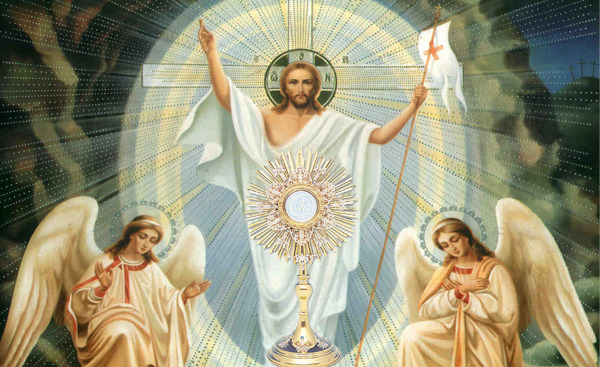
Therefore you now have sorrow; but I will see you again and your heart will rejoice, and your joy no one will take from you.
On Wednesday we considered an Old Testament prophecy that could provide some nice background to this week’s Gospel. Here it is again: “He has blinded their eyes and hardened their hearts, Lest they should see with their eyes, Lest they should understand with their hearts and turn, So that I should heal them.”
In the classic tradition of “Hebrew parallelism” – where an image is laid down, and then in the next line, it is laid down in different words – blinded eyes and hardened hearts parallel seeing with the eyes and understanding with the hearts. It is the latter that lays the foundation for turning to the Lord and being healed.
This week’s Gospel works with the “see” image, but we have a hunch the sort of “sight” talked about is the “sight of faith,” which in practical terms relates more to “understanding of the heart.” Jesus, I would argue, uses the “see” image because of that palpability we’ve meditated on. Bread, water, wine, and persons, after all, are real things and really seen, and through these things yes, Christ’s body is most certainly something “seen.”
But clearly there’s another sort of sight, the kind possessed by those who “don’t see but yet believe.” Or the sort that John was granted in the great “unveiling” that we call the book of Revelation – “Revelation” means “making unhidden” or “unveiling.” This is also the sight that was granted to Mary, Peter, and the disciples on the road to Emmaus, clearly a sight that only comes into being along with a faith created by Jesus’ work, either of calling their names or breaking bread.
We’ve impressed that faith should be palpably real, so palpable that we can’t help but be joyful at all times and in all places. Alas, the “-ate” still lingers, and Jesus has to mandate us against our own recalcitrant selves: He has to command us to be joyful because He is telling us what we possess, victory and goodness despite what our unbelieving eyes are telling us.
Well, with this final verse in this week’s Gospel, it’s like Jesus resolves one issue and then introduces another profound thought. He says, “I will see you again and your heart will rejoice.”
Ahhhh (on one hand), OK, so it is the heart all along Jesus was talking about, just as the Old Testament prophecy said in the parallelism. The “unseeing eye” is the hardened heart; the “seeing eye” is the heart of understanding. This is exactly what we have been proposing.
But then (on the other hand) we get a new thought. Jesus sees us again! All along the flow of Jesus’ four-times repeated teaching was “a little while and you won’t see me, and then a little while and you will see me again.” It was all about the disciples, and by implication us, seeing Jesus. But here, Jesus switches focus from the eyes to the heart. “Your heart will rejoice.” And then talks about how He will see them. In fact, it’s His seeing of them that results in their joy being complete.
And indeed, that does seem to align things rightly with what we’ve been contemplating. Mary did not “see” Jesus (understand in her heart) until Jesus first saw her. Same with the disciples in the upper room, the ones on the road to Emmaus, and the ones in the boat.
And likewise today, the burden is not on us to “see” Jesus, and it would be a misinterpretation of the results of our meditation if we turned this text into an injunction to “expand your vision of Jesus, you small-sighted slug of a believer!” Rather, the Actor in all this is Jesus. He sees us so that we might see Him.
As John says in his epistle: “Beloved, now we are children of God; and it has not yet been revealed what we shall be, but we know that when He is revealed, we shall be like Him, for we shall see Him as He is.”
He hasn’t been revealed. We don’t see Him yet. But when He “is revealed,” we shall be like Him, mirroring who he is. But to import St. Paul into this discussion, “For now we see in a mirror, dimly, but then face to face. Now I know in part, but then I shall know just as I also am known.”
There it is: one day we will “know” (St. Paul) / “see” (St. Paul), just as we also are “known” (St. Paul), or “seen” (St. John).
So, this side of the final revelation of the sons of God, we most certainly “see” and “know” Jesus, by the faith of the heart, as He comes to us mystically (sacramentally) in a hidden way. It’s palpably real, but not as He will be revealed one day.
And this dimly-seen sight parallels our own persons.
We’re all sort of “winging” it down here, aren’t we. Like the disciples in the boat, the sea is churning all around us, evils seem everywhere. And there lies Jesus, blissfully sleeping in the hull, saying, “When you see me you’ll rejoice even in the midst of the storm, because that storm means death, and death means victory. I’ve made it that way.”
But despite that, we’re more like Peter, taking our eyes off Jesus and falling into the waves in dread terror. Every human instinct tells us to be sorrowful, to fear the world, to see all the evils of the world and be overwhelmed. Being joyful in the midst of this is not the natural thing to do.
And that is precisely why Jesus has to command it: jubilate! It’s a command of ultimate trust. Rejoice in the midst of sorrow, trust me, you can!